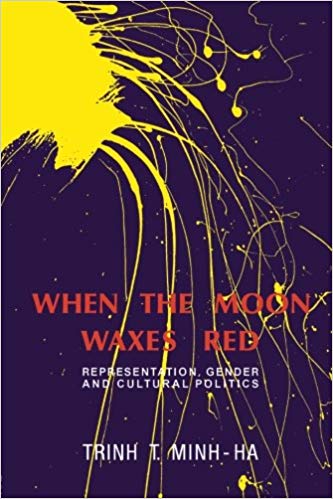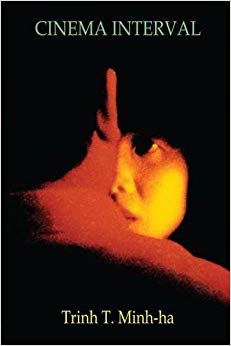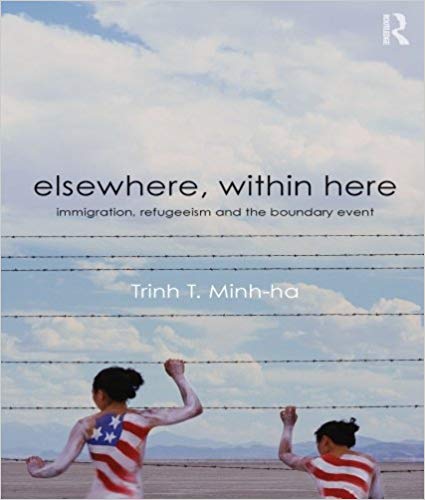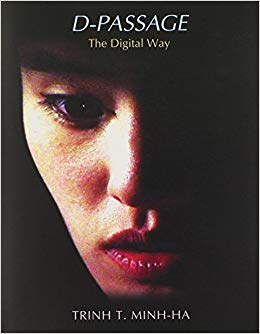Background
Trinh T. Minh-ha was born in 1952 in Hanoi, Vietnam. She was brought up in South Vietnam during the Vietnam War and immigrated to the United States in 1970.

University of Illinois, Champaign, Illinois, United States
Trinh T. Minh-ha studied music composition, French literature and ethnomusicology at the University of Illinois, Champaign-Urbana, where she received her Ph.D. degree.
112 Nguyen Du Street, District 1, Ho Chi Minh City, Vietnam
Trinh T. Minh-ha studied piano and music composition at the National Conservatory of Music and Theater (now the Conservatory of Ho Chi Minh City) in Saigon.







(Out There addresses the theme of cultural marginalization...)
Out There addresses the theme of cultural marginalization - the process whereby various groups are excluded from access to and participation in the dominant culture. It engages fundamental issues raised by attempts to define such concepts as mainstream, minority, and "other," and opens up new ways of thinking about culture and representation. All of the texts deal with questions of representation in the broadest sense, encompassing not just the visual but also the social and psychological aspects of cultural identity.
https://www.amazon.com/Out-There-Marginalization-Contemporary-Culture/dp/026256064X/?tag=2022091-20
1990

(In this new collection of her provocative essays on Third...)
In this new collection of her provocative essays on Third World art and culture, Trinh Minh-ha offers new challenges to Western regimes of knowledge.
https://www.amazon.com/When-Moon-Waxes-Red-Representation/dp/0415904315/?tag=2022091-20
1991

(Trinh T. Minh-ha is one of the most powerful and articula...)
Trinh T. Minh-ha is one of the most powerful and articulate voices in independent filmmaking. In her writings and interviews, as well as in her filmscripts, Trinh explores what she describes as the "infinite relation" of word to image. Cinema-Interval brings together her recent conversations on film and art, life and theory, with Homi Bhabha, Deb Verhoeven, Annamaria Morelli and other critics.
https://www.amazon.com/Cinema-Interval-Trinh-T-Minh-ha/dp/0415922003/?tag=2022091-20
1999

(Elsewhere, Within Here is an engaging look at travel acro...)
Elsewhere, Within Here is an engaging look at travel across national borders - as a foreigner, a tourist, an immigrant, a refugee - in a pre- and post-9/11 world.
https://www.amazon.com/Elsewhere-Within-Here-Immigration-Refugeeism/dp/041588022X/?tag=2022091-20
2010

(D-Passage is a unique book by the world-renowned filmmake...)
D-Passage is a unique book by the world-renowned filmmaker, artist, and critical theorist Trinh T. Minh-ha. Taking as grounding forces her feature film Night Passage and installation L'Autre marche (The Other Walk), both co-created with Jean-Paul Bourdier, she discusses the impact of new technology on cinema culture and explores its effects on creative practice.
https://www.amazon.com/D-Passage-Digital-Minh-ha-T-Trinh/dp/082235540X/?tag=2022091-20
2013

(In this new work, renowned feminist filmmaker and postcol...)
In this new work, renowned feminist filmmaker and postcolonial theorist Trinh T. Minh-ha offers a lyrical, philosophical meditation on the global state of endless war and the violence inflicted by the imperial need to claim victory.
https://www.amazon.com/Lovecidal-Disappeared-Trinh-T-Minh-ha/dp/0823271102/?tag=2022091-20
2016
composer educator Feminist filmmaker literary theorist writer
Trinh T. Minh-ha was born in 1952 in Hanoi, Vietnam. She was brought up in South Vietnam during the Vietnam War and immigrated to the United States in 1970.
Trinh T. Minh-ha studied piano and music composition at the National Conservatory of Music and Theater (now the Conservatory of Ho Chi Minh City) in Saigon.
She then left Vietnam during the Vietnam war in 1970 at the age of 17, and studied music composition, French literature and ethnomusicology at the University of Illinois, Champaign-Urbana, where she received her Ph.D. degree.
As an exchange student, Trinh also attended the Sorbonne Paris-IV.
After receiving her Ph.D., Trinh T. Minh-ha taught at the National Conservatory of Music in Dakar, Senegal from 1977 to 1980. Senegal was the focus of Trinh's first film "Reassemblage" (1982), which documents the lives of women in rural Senegal.
Trinh T. Minh-ha has been a professor in the Gender and Women's Studies Department at the University of California, Berkeley since 1994 and in the Department of Rhetoric since 1997. She has also taught at Harvard, Smith, Cornell, San Francisco State University, the University of Illinois, Ochanomizu University in Japan, and the National Conservatory of Music in Senegal.
Her work has ranged from musical composition to filmmaking and essays on social theory. Aside from the eight books she has published, her work also includes two large-scale multimedia installations and six feature-length films that have been honoured in twenty seven retrospectives around the world: Reassemblage (1982), Naked Spaces (1985), Surname Viet Given Name Nam (1989), Shoot for the Contents (1991), A Tale of Love (1996), The Fourth Dimension (2001), and Night Passage (2004).
Trinh's most recent book "Lovecidal" was published in July, 2016.
In addition, Trinh T. Minh-ha has been a contributor of articles to periodicals, including Aperture, City Lights Review, and Motion Picture. She has also been a guest editor of Discourse: Journal for Theoretical Studies in Media and Culture.
Trinh T. Minh-ha has been a recipient of numerous awards and grants, including the Trailblazers Award at MIPDOC, Cannes; AFI National Independent Filmmaker Maya Deren Award, fellowships from the Guggenheim Foundation, the National Endowment of the Arts, the Rockefeller Foundation, the American Film Institute, The Japan Foundation, and the California Arts Council, among others.
Besides, her films have been given over fifty retrospectives in the United States, the United Kingdom, Brazil, Canada, Italy, Korea, Spain, the Netherlands, Slovenia, France, Germany, Switzerland, Austria, Japan, India, Taiwan, Hong Kong, Jerusalem, and were exhibited at the international contemporary art exhibition Documenta 11 in 2002 in Germany.
Trinh's films have also shown widely in the United States, in Canada, Senegal, Australia, and New Zealand, as well as in Europe and Asia (including in Italy, Belgium, Spain, Sweden, Finland, Japan, India, Taiwan, Jerusalem). Her film "Reassemblage" was exhibited at The New York Film Festival in 1983 and has toured the country with the Asian American Film Festival among other festivals.
(Out There addresses the theme of cultural marginalization...)
1990(Elsewhere, Within Here is an engaging look at travel acro...)
2010(In this new collection of her provocative essays on Third...)
1991(D-Passage is a unique book by the world-renowned filmmake...)
2013(In this new work, renowned feminist filmmaker and postcol...)
2016(Trinh T. Minh-ha is one of the most powerful and articula...)
1999Trinh's work in literary theory is one that defies national borders and resists singular definitions. She focuses on the themes of transcultural interactions, transitions, the production and perception of difference, and the intersection of technology and colonization. The influence that technology and cyberspace have had on the "making and unmaking of identity" has been the focus of her more recent works. For Trinh, the concept of "elsewhere" intersects with the idea of the "inappropriate other". Although she coined this term in the eighties, the "inappropriateother" continues to factor in her work, as both a filmmaker and critic due to its focus on liminal subjecthood.
Trinh T. Minh-ha does not view the process of writing and filmmaking to be inherently different, thinking "more in terms of processes of transformation" than of actual messages. Rather, the message is delivered of the course of creating a work. This is clear when examining published works such as D-Passage, which combines elements of literary theory alongside her films and screenplays.
Trinh T. Minh-ha is married to Jean-Paul Bourdier.
